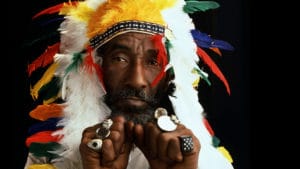by The People’s Minister of Information JR
Few musicians have had such an everlasting impression on the music of the 20th century internationally as the legendary Reggae and Dub producer and vocalist Lee “Scratch” Perry. Born in Jamaica as a contemporary of Bob Marley and the Wailers, Scratch has had an exciting life.
From having had “Trenchtown Rock” by the Wailers written as a diss song about him to Scratch burning up his studio that he felt had too much negative energy then writing his classic “I’m a Madman” and his near deification in Europe as one of the primary architects of Dub all the way to his production being sampled on Jay Z’s classic “Lucifer,” Lee Scratch Perry is a force in the audio-sphere to be reckoned with.
“Vision of Paradise” is a new documentary that Scratch is the subject of as well as an executive producer along with Volker Schaner, who we contacted in Germany to get this exclusive interview before the film’s premiere in San Francisco on Saturday, June 13, 4 p.m., at the Variety Club Premiere Room, 582 Market at Montgomery, as a part of the San Francisco Black Film Festival. For more info on the festival, you can visit sfbff.org. Here is Volker Schaner in his own words.
M.O.I. JR: Can you talk about how your film got its name? And why did you want to do a documentary with the ever eccentric Lee Scratch Perry considering that there already is one called “The Upsetter”? What makes yours different?
Volker Schaner: Everything Lee Perry is doing comes from that vision, the vision of paradise. Everything should lead to the reinstallment of paradise. It’s a mental setup. Just say there are no problems. So there won’t be problems. And you find people that think likewise. This vibration you can hear in Reggae and Lee’s music; it is not a cliché.
And this is exactly the feeling we wanted to show in the movie. It’s incredible powerful. “The Upsetter” movie is telling the life of Lee; we wanted to meet the spirit. I think even two full length movies like ours, which are complementing each other, somehow cannot completely satisfyingly tell the story of this man.
M.O.I. JR: When and how did Lee Scratch Perry create Reggae and Dub?
Volker Schaner: This is a historical question and quite difficult to answer, especially for me. Did he invent Reggae and Dub alone? He would never say that. There are a lot of other great musicians – King Tubby, Toots, Bob Marley of course – who were very influential in Jamaica in the late 60s.
But they all were incredibly inspired by Scratch somehow. He conveys this feeling: When you are with him you are creating something great. You are following him automatically and I think it has never been different, now and then. He always knows what he is doing, he is following a plan or a voice or something.

He had put that intense beauty and spirituality into Reggae and Dub, something which had not been heard before. And the intense use of effects in his Dub recordings are nothing else than another expression of deep spirituality – through technology.
M.O.I. JR: Can you talk a little bit about Scratch’s music with the Wailers?
Volker Schaner: I can answer this question only from a personal point of view. This music is so great it totally changed my life. “Natural Mystic,” “Rainbow Country,” “Sun Is Shining,” “Small Axe,” “Duppy Conqueror” and “Soul Rebel” – all those songs are groundbreaking classics with such an intense feeling it’s unbelievable. The words are a manifest to create a new generation; the melodies are immortal and pure magic.
Bob Marley has changed totally since he was with Scratch. Just listen to the recordings; it is all there. “Jah Live” is maybe the most important collaboration, I think. It is not a song anymore; it became a prayer. Jah Rastafari is good over evil and cannot die. That’s it.
M.O.I. JR: How and when did things get patched up?
Volker Schaner: Well, I was not there, so what should I say? Those events are legendary. Lee made a lot of songs about it, poetic interpretations. After all, I think Bob Marley convinced The Upsetters to become The Wailers to head for international success. And they left Lee alone back in Jamaica after he shaped them to what they became.
The other story is that Lee is said to have sold the Wailers tapes without their consent – so what is the truth? I think they truly loved each other. I can’t say a lot about the great Peter Tosh and Bunny Wailer. There are others who know much more than me about that.
M.O.I. JR: How would you describe Lee Scratch Perry’s music?
Volker Schaner: A sparkling psychedelic adventure. Music from the time before the original sin.

M.O.I. JR: How would you describe his production that he did for other artists?
Volker Schaner: Lee Perry did thousands of songs. He had a pile of riddims and let different artists record on them. So there are a lot of versions of the same riddim.
I know he likes very much to record in one take, without too much huzzling or repeating. On the other hand, I also know that with some songs he stayed weeks to mix them; and with some artists like Bob Marley, Junior Murvin, Max Romeo and The Congos, for instance, he stayed day and night to practice and sharpen.
One thing is sure: He always brought out the very best of all the artists he was working with.
M.O.I. JR: How has moving to Europe affected his music?
Volker Schaner: He changed his music completely. There wasn’t the typical Black Ark-Sound anymore, he was no producer anymore; he became a singer and author, a word-associating artist. And he refined his vocal abilities, worked with younger European producers like Adrian Sherwood and Mad Professor. They said they learned a lot from Scratch and again you can hear they stepped into new territories.
M.O.I. JR: How has it affected his appeal, now that he is in Switzerland instead of Jamaica?
Volker Schaner: He says he carries Jamaica with him everywhere he goes. To me, he seems to be a bit happier when he is in Jamaica and when he sees his people are happy also.
M.O.I. JR: What is Scratch’s life like in Switzerland?
Volker Schaner: When he is not touring, he is mostly writing on his computer or painting. Surrealistic writings, poetry that comes to him. He is reaching amazing levels of concentration; it’s hard to disturb him.
M.O.I. JR: Does he still tour?
Volker Schaner: Of course he does. He is like a prophet, an elder statesman, a living legend with an ever growing fanbase that waits to meet him regularly – to celebrate together.
M.O.I. JR: How does the film end?
Volker Schaner: The movie ends with a song. Can’t tell you more now; you have to see it!
M.O.I. JR: How could people keep up with you and the film online?
Volker Schaner: With our website: www.visionofparadise.de, on Facebook at https://www.facebook.com/leescratchperrys.visionofparadise, and Twitter: https://twitter.com/LSPVOP. And these days we are starting promotion, so stay tuned! One Love!
The People’s Minister of Information JR Valrey is associate editor of the Bay View, author of “Block Reportin’” and “Unfinished Business: Block Reportin’ 2” and filmmaker of “Operation Small Axe” and “Block Reportin’ 101,” available, along with many more interviews, at www.blockreportradio.com. He can be reached at blockreportradio@gmail.com.
[soundcloud url=”https://api.soundcloud.com/tracks/207698680″ params=”auto_play=false&hide_related=false&show_comments=true&show_user=true&show_reposts=false&visual=true” width=”100%” height=”450″ iframe=”true” /]






